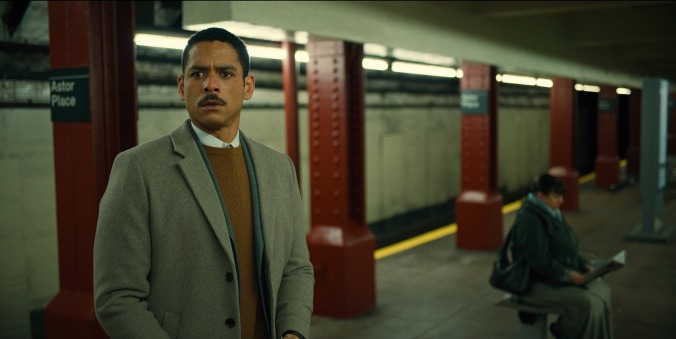Netflix's Russian Doll is an exquisitely trippy odyssey in season 2
Natasha Lyonne travels through time and generations for a wild and soul-stirring second season

In Russian Doll season two, New York City’s subway system is the freakiest it’s ever been on screen, and that’s really saying something. The 6 train transforms into a portal for Nadia Vulvokov (Natasha Lyonne) and Alan Zaveri (Charlie Barnett) to inadvertently travel back in time. The duo spent season one trying to escape a diabolical time loop where they kept dying at the same time, only to restart at a specific point. Four years after escaping this fate, they’re at the mercy of temporal madness again. Several train trips unravel their family’s past, setting Nadia on a course to possibly alter her future. The result is seven bewitching, off-kilter, and visually stunning episodes.
Netflix’s enthralling show debuted over three years ago. It seamlessly integrates metaphysical elements with biting humor, ipso facto—heh—it’s labeled a sci-fi dramedy. But categorizing Russian Doll as one thing does it a disservice. It’s a prolific character study at its core. The show takes an inventive and tender approach to a well-established plot device (as seen from Groundhog Day to Palm Springs and in-between). The goal isn’t to improve Nadia or Alan as people with every passing loop, but to help them confront buried trauma so they can eventually assist each other to avoid their dark fate.
Time loops, time travel, and multiverses stories are an especially hot commodity in pop culture right now, what with all the Spider-Men converging, Everything Everywhere All At Once, or upcoming shows like Apple TV+’s Shining Girls and HBO’s The Time Traveler’s Wife. Audiences are experiencing their own deja vu, so why go through it again? Plus, Russian Doll’s surreal and perfect end arguably makes a case for not rehashing the show at all. Luckily, season two justifies its existence. It reinvents its protagonists and its mythology, using the duo’s complex ancestry as a gut punch to further develop them.
Russian Doll now switches between years and countries; it’s contained and expansive at the same time. A few days before her 40th birthday, Nadia gets pulled into ‘80s New York City when she steps into a wormhole of a train compartment. She reaches the same time period as her dead mother, Lenora (a fantastic Chloë Sevigny, on the heels of The Girl From Plainville), and is a first-hand witness to Lenora’s rough relationship with her own mom (a.k.a Nadia’s grandmother).
Amid the chaos—of which there is plenty, especially in the last few episodes—the show finds grounded emotional resonance. Nadia tries to rectify mistakes that directly impacted her upbringing. She makes eyebrow-raising choices (one, in particular, is fully mind-bending) that blur the concept of reality. The new season is ultimately a trippy but poetic display of intergenerational trauma for the Vulvokov women over the years. It’s weird and unpredictable. But it’s also Russian Doll at its unique best.
Nadia finds an unexpected friend in the character Annie Murphy plays (revealing more about the Schitt’s Creek actor’s role borders on spoiler territory). Russian Doll isn’t a serious, all-out futuristic show, so the time travel doesn’t adhere to strict rules. Nadia often goes to-and-fro from 1982 to 2022, and to some other places too. The riveting parallels between all her worlds elevate the suspense, which carries the essence of a time heist. Nadia’s best friend Maxine (acerbic comic relief Greta Lee) and godmother Ruth (Elizabeth Ashley) also fold into the story a bit more.
Meanwhile, Alan navigates his family’s backstory through train rides transporting him to parts of Europe. It might seem distinctive at first, but his arc weaves into the larger narrative in equally wild ways. Russian Doll maneuvers its “box of timelines,” as Nadia quotes in the season one finale, through carefully constructed details. No interaction is random. (Reader, this viewer recommends immediately rewatching early season two episodes after finishing it to catch all the Easter eggs, from certain dialogues to seemingly irrelevant faces).
One of the most appealing parts of season one was Lyonne and Barnett’s inexplicable chemistry. Their characters’ crushing experiences together in purgatory-of-sorts led to Nadia and Alan forming a singular connection. Russian Doll falls short of that in season two because each of them is on their own path. While their tracks do eventually converge, it comes a little too late.
The writers, led by series co-creators Lyonne, Leslye Headland, and Amy Poehler, deliver top-tier caustic humor once more. Don’t worry, there are organic references to previous jokes like “What a concept” and Lyonne muttering “cock-a-roach” in her special style. Even Harry Nilsson’s “Gotta Get Up” finds its way back in. The ensemble is top-notch, with Lee stepping up as Maxine gets better material. Murphy is an incredible addition as well. But nothing beats Lyonne’s firecracker of a performance; it’s extremely precise yet irrevocably freeing. She finds new depths to Nadia’s pain and misery without ever losing her comic timing. It’s a delicate balance, and Lyonne crushes it.
Russian Doll leaves a strong legacy as one of the most exciting experimental and nuanced shows in recent years. There’s no telling if it will return for another installment. It’s a risky gimmick after all, and not every show needs to stretch out its lifespan, especially not this one. Two seasons’ worth of time travel adventures has cemented Russian Doll as one of Netflix’s most esoteric and binge-worthy originals (to stem from the U.S., at least). Hopefully, it ends on this high note.